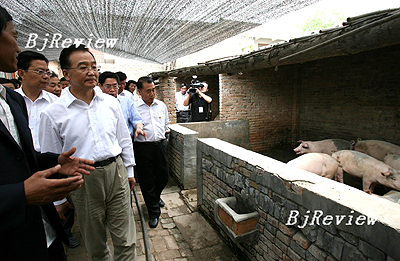
Although the price of pork has steadied after continuous hikes since April, the consumer price index (CPI) has been boosted by the rising price, an event that has caught the attention of the public. Pork prices have risen in the past few months due to the higher cost of feed grain and the reduced numbers of pigs due to diseases that have hit the pig population.
Statistics published by the National Bureau of Statistics (NBS) on June 12 show that the CPI jumped 3.4 percent in May. The index rose 2.9 percent in the first five months compared with the same period last year.
The Chinese Government has proposed measures to hold the CPI growth under 3 percent this year, but the 2.9 percent rise in the first five months has obviously challenged the government’s goal.
CPI includes two categories: food and non-food products. Non-food prices didn’t change much in the first five months, while food prices soared on the back of the sky-high pork price.
According to inspections by the National Development and Reform Commission (NDRC) in 36 large and medium-sized cities, pork prices peaked at 21.52 yuan per kg on May 30, double the price at the beginning of this year. On June 8, the prices of eggs, beef and mutton increased by 51.6 percent, 15.8 percent, and 16.5 percent, respectively, year on year. The rapid increase of pork and egg prices has become the major factor behind the rising CPI.
As a matter of fact, food prices began to rise last year. Grain prices have surged since the end of last year, followed by soaring peanut oil, pork and egg prices.
A research report from Guosen Securities stated that if grain prices remain under control, skyrocketing meat, poultry and egg prices may push the CPI to 4 percent in June and food prices will continue to lead the CPI increase. “Whether the food price increase will spread to other industrial products should be followed closely,” said the report.
Relevant government departments have already taken measures to control the chain reaction led by the pork price increase. The NDRC, the Ministry of Finance, Ministry of Agriculture, Ministry of Commerce, General Administration of Quality Supervision, Inspection and Quarantine, and the State Administration for Industry and Commerce have formed a group to handle the food price increase. The group meets once a week to analyze market problems and to come up with countermeasures. Relevant departments of the State Council and local governments have adopted a series of policies to stabilize the supply of pork, which has already had some effect on controlling the rising pork prices.
The rising CPI has made research institutes uneasy. Goldman Sachs argued that inflation has become one of the most challenging risks to Chinese economic development. A report from Goldman Sachs stated that developed countries only spend 10 percent of family income on foodstuff, while China and other developing countries spend as much as 30 percent on food. Food plays an important factor in China’s CPI. Goldman Sachs pointed out that the price of pork accounted for 7 percent of the CPI, enough to possibly lift the index above 4 percent in the coming months, increasing inflationary pressures. Inflation could also put more pressure on the interest rate rise. The People’s Bank of China (PBOC), the central bank, has raised the interest rate twice this year to control possible inflation and squeeze excessive liquidity out of the market.
Zuo Xiaolei, Chief Economist with Galaxy Securities, echoed Goldman Sachs’ opinion. She said China is confronted with inflation risks due to three reasons. First, in May, CPI growth in rural areas (3.9 percent) was faster than that in urban areas (3.1 percent). Second, food prices grew faster than non-food prices in May, which were 8.3 percent and 1 percent, respectively. Third, prices of consumer goods increased faster than service prices in the same month-3.9 percent and 1.7 percent, respectively.
“The central bank must do something to control the CPI,” said Zuo.
Zhou Xiaochuan, PBOC Governor, stated that the central bank is giving close attention to pork and egg prices. But he added that food prices are just one component of the CPI, and whether the central bank will raise the interest rate should depend on the overall CPI performance.
Liu Shangxi, Vice Director of the Research Institute for Fiscal Science under the Ministry of Finance, showed his opposition to raising the interest rate. Liu said, “Some people suggest the central bank should increase the interest rate as soon as possible, but I don’t agree. We should wait and observe before we take more actions. Food prices are just one factor.”
Currently, food prices accounted for 33.2 percent of all CPI factors, with non-food factors making up the remaining 66.8 percent. NBS statistics show that non-food prices rose 1 percent in May. Researchers from the government departments contended that it is still too early to talk about inflation at the current stage.
Zhou Wangjun, Vice Director of NDRC’s Department of Price, pointed out that industrial consumer goods have been decreasing in the past 10 years due to excessive supply. Prices for services like water, electricity and gas are controlled by the government and the government can, when necessary, control prices through administrative orders. The price rise of one third of CPI factors won’t pose great inflationary pressure on the Chinese economy. | 